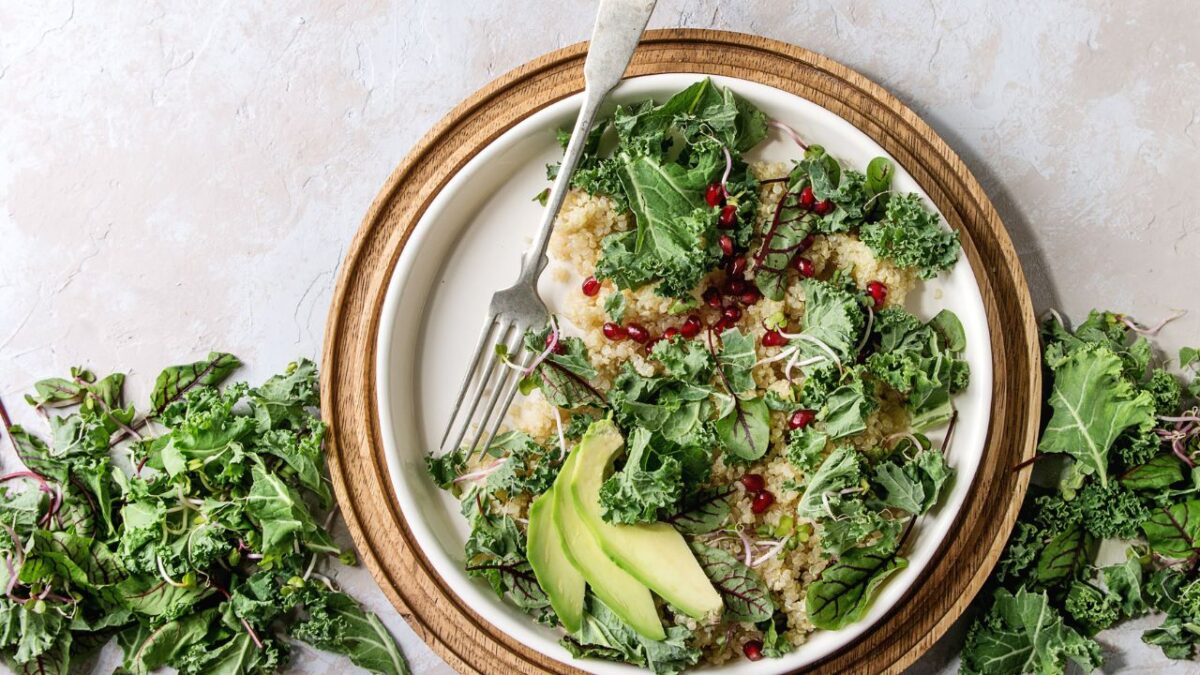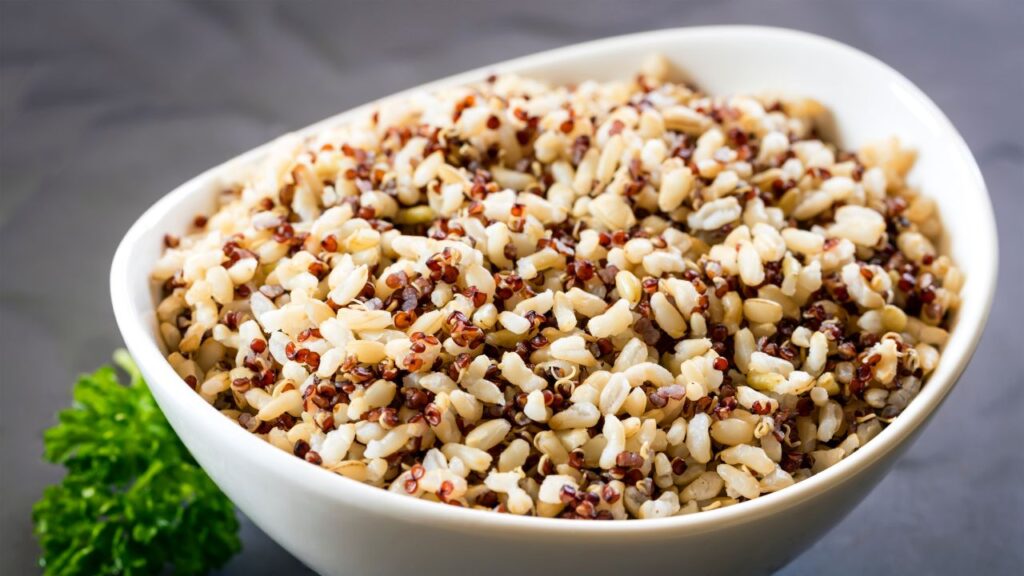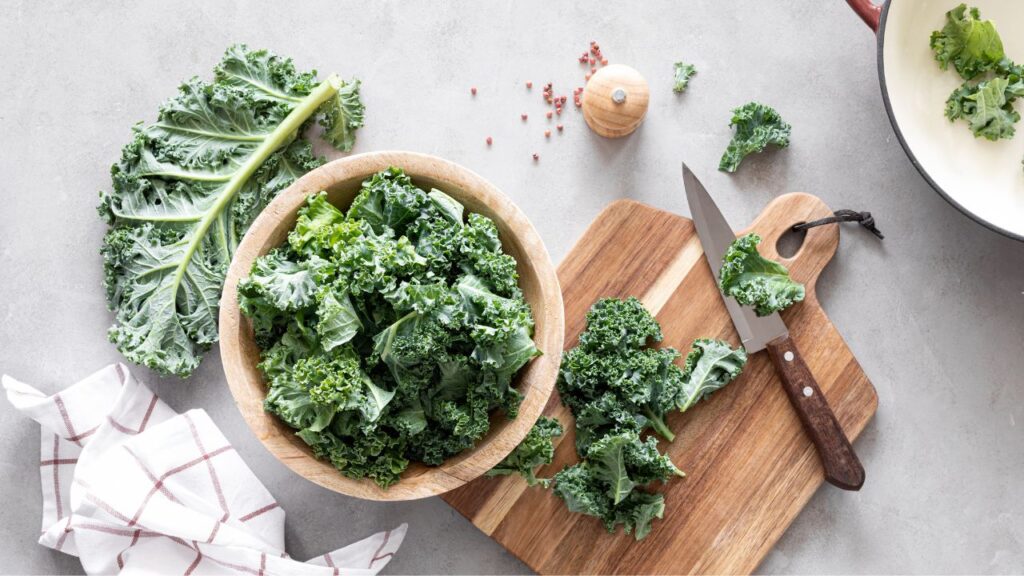Quinoa and Kale Salad with Flaxseeds For Your Menopause Diet

Embarking on a menopause diet journey can be transformative, especially when you incorporate nutrient-rich meals like the Quinoa and Kale Salad with Flaxseeds. This dish isn’t just a delight for your taste buds; it’s a powerhouse of ingredients that align perfectly with the nutritional needs of a menopause diet.
Menopause brings significant changes to a woman’s body, including altered metabolism and hormonal imbalances. It’s crucial to focus on foods that not only nourish but also help in managing these changes. The Quinoa and Kale Salad with Flaxseeds is a perfect example of how you can turn simple ingredients into a menopause diet staple.
Quinoa, the star of this salad, is a complete protein, packed with all nine essential amino acids. It’s also high in fiber, which is excellent for digestive health and can help in maintaining a healthy weight – a common concern during menopause. Kale, another key ingredient, is loaded with nutrients like calcium, crucial for bone health as estrogen levels drop. The addition of flaxseeds brings in omega-3 fatty acids, known for their anti-inflammatory properties and potential to alleviate menopause symptoms like hot flashes.
This salad isn’t just about what it contains; it’s also about what it lacks. Free from processed ingredients and high in natural, whole foods, it’s perfectly in sync with a menopause diet aimed at reducing processed and high-sugar foods. Every bite of this Quinoa and Kale Salad with Flaxseeds is a step towards balancing your menopause diet with deliciousness and nutrition.
Quinoa and Kale Salad with Flaxseeds
- Main Ingredients
- 1 cup quinoa
- 2 cups water
- 2 cups chopped kale
- 1/2 cup diced red bell pepper
- 1/4 cup chopped red onion
- 1/4 cup toasted almond slivers
- 2 tablespoons flaxseeds
- 1/4 cup dried cranberries
- For the Dressing:
- 3 tablespoons olive oil
- 2 tablespoons apple cider vinegar
- 1 tablespoon honey (or maple syrup for a vegan option)
- Salt and pepper to taste
Instructions:

- Cook the Quinoa: Rinse the quinoa under cold water. In a saucepan, bring 2 cups of water to a boil. Add the quinoa, reduce heat to low, cover, and simmer for about 15 minutes or until the quinoa is cooked and the water is absorbed. Let it cool.
- Prepare the Kale: While the quinoa is cooking, wash and chop the kale. To soften it, you can massage the kale with a little olive oil.
- Toast the Almonds: In a dry skillet over medium heat, toast the almond slivers until they’re golden brown. Be careful to avoid burning them.
- Make the Dressing: In a small bowl, whisk together olive oil, apple cider vinegar, honey, salt, and pepper.
- Combine the Salad: In a large bowl, combine the cooled quinoa, kale, red bell pepper, red onion, toasted almonds, flaxseeds, and dried cranberries.
- Add the Dressing: Pour the dressing over the salad and toss everything together until well mixed.
- Serve: You can serve this salad immediately or let it sit in the refrigerator for an hour to allow the flavors to meld together.
Nutritional Benefits:

- Quinoa: A great source of protein and fiber.
- Kale: High in vitamins A, C, and K, and calcium.
- Flaxseeds: Rich in omega-3 fatty acids and lignans, which can help in managing menopause symptoms.
- Almonds: Provide healthy fats, fiber, and protein.
- Cranberries: Add a hint of sweetness and are a good source of antioxidants.
Menopause often means dealing with a slower metabolism, weaker bones, and a higher chance of heart issues. Plus, it’s no secret that it can bring some pretty uncomfortable stuff like hot flashes and trouble sleeping.
Eating lots of fruits, veggies, whole grains, top-notch proteins, and dairy can really help ease those menopause symptoms. Including foods with calcium, phytoestrogens and good fats, like the omega-3s you get from fish, is also a smart move.
This recipe is not only nutritious but also versatile. You can add other ingredients like avocado, cucumber, or chickpeas for added nutrients and flavors. Remember, individual dietary needs can vary, so it’s always good to consult with a healthcare provider or dietitian when making significant changes to your diet.
Tip: It’s a good idea to cut back on the sweet stuff, those super processed carbs, booze, caffeine, and salty foods too. Tweaking your diet like this can really smooth out the bumps of this major life change.

